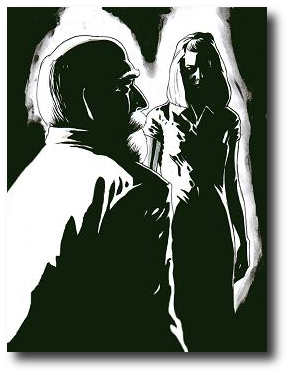Bruce Holland RogersDecember 2007 Reconstruction Work I waited. And waited. I was not going to give her solitude. At last, she came to stand beside the coffin. We stood in silence together.
Next to the casket, I leaned on my cane and admired the work my brother practitioners had done on Elizabeth Fordham Roth. She had died at 80, but she did not look a day over 60 and might have only been sleeping. Physical reconstruction. Cosmetics. Those are the easier mortuary arts. It is the work of an afternoon to sew eyelids shut with invisible stitches, to close a slack jaw, to smooth out wrinkles and rouge pallid cheeks back to seeming life. My branch of the discipline is far more subtle and is never finished in a single afternoon. The young woman I was waiting for entered the chapel. I looked away from her but was aware of her approach as she came up the aisle. She hesitated, as if to give this elderly man, this stranger, whatever time he needed with her grandmother. I waited. And waited. I was not going to give her solitude. At last, she came to stand beside the coffin. We stood in silence together. “She had quite the life,” I said at last. The granddaughter said nothing. She set her mouth in a hard line. “A good life,” I said. “And comfortable.” Still no reaction, though a muscle jumped along her jaw. “Are you family?” I said. She nodded. “I knew her when she was a girl,” I said. “My family had money, too, in those days. But not like the Fordhams. Riding stables. Servants. The lawns and gardens. There was a maze of hedges. Heaven for a child.” “Well,” she said. And that was all. I said, “And of course her father doted on her.” The granddaughter turned to look at me. “Her father — ” she began. She squinted. “I don’t think we’ve met.” “No,” I said, and bowed my head as if I had just given her my name. “Nice to meet you.” Age purchases a right to eccentricity, to vagueness. She didn’t ask directly for my name. “Francis Fordham,” she said, “was not such a good...” She looked at the coffin. “He did things to her.” “He did things...” I let my words trail off. Then I shook my head and sighed. “Not that old nonsense....” “What do you mean, old nonsense?” “I’m sorry. It’s none of my business, really. But in the last few years, your grandmother’s memory wasn’t... Oh, dear. I’m sorry. I don’t mean to speak ill of dear Lizzie. But her father was a gentleman, in an era when the word still meant something. He would never...” I waved my hand, dismissing the idea that Francis Fordham could have ever done anything improper to his daughter. “He did. She told me.” “Ahhh,” I said, doing my best to convey scepticism. I looked away as if I were considering whether it was my place to go on. Then I said, “The memories of an old person are sometimes confused, my dear.” I made a point of looking at the coffin and shaking my head. That should be sufficient. I nodded and took my leave, saying again as I went, as if in sorrow for the delusional state of my departed friend, “Poor Lizzie.” There were many guests on the Fordham estate in the heyday of Fordham wealth and power. A long-time friend for Elizabeth was certainly plausible. She knew so many people. What grandchild would know all of her grandmother’s friends? The young woman might still believe the version of events that Elizabeth Fordham Roth once told her, but I had at least planted a seed of doubt. In my profession, we had been planting seeds of one kind or another about Francis Fordham ever since his death. That’s what we do. We’ll continue to work on the remembrance of this man until the mortuary endowment runs out. It’s a healthy endowment. As I said, mine is hardly the work of an afternoon. Tip the AuthorIf you liked this, tip the author! We split donations, with 60% going to the author and 40% to us to keep the flashes coming. (For Classic Flashes, it all goes to support Flash Fiction Online.) Payments are through PayPal, and you can use a credit card or your PayPal account. About the AuthorBruce Holland Rogers Bruce Holland Rogers has a home base in Eugene, Oregon, the tie-dye capital of the world. He writes all types of fiction: SF, fantasy, literary, mysteries, experimental, and work that’s hard to label. For six years, Bruce wrote a column about the spiritual and psychological challenges of full-time fiction writing for Speculations magazine. Many of those columns have been collected in a book, Word Work: Surviving and Thriving as a Writer (an alternate selection of the Writers Digest Book Club). He is a motivational speaker and trains workers and managers in creativity and practical problem solving. He has taught creative writing at the University of Colorado and the University of Illinois. Bruce has also taught non-credit courses for the University of Colorado, Carroll College, the University of Wisconsin, and the private Flatiron Fiction Workshop. He is a member of the permanent faculty at the Whidbey Writers Workshop MFA program, a low-residency program that stands alone and is not affiliated with a college or university. It is the first and so far only program of its kind. Currently he is teaching creative writing and literature at Eötvös Loránd University in Budapest, Hungary, on a Fulbright grant. Your Commentscomments powered by DisqusCopyrightCopyright © 2007, Bruce Holland Rogers. All Rights Reserved. |

